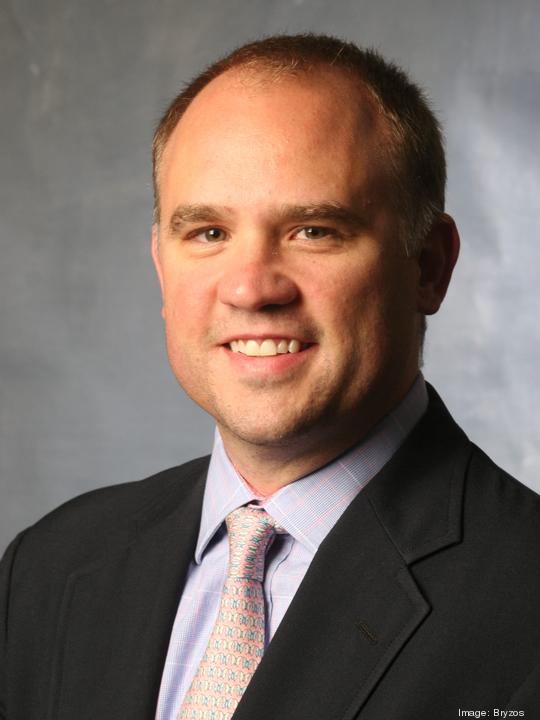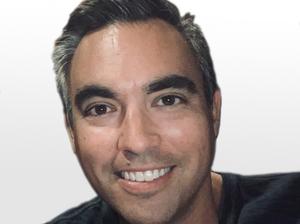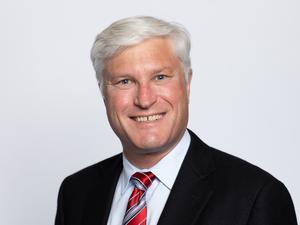
Shep Hickey was working at American Piping Products when he had the idea for an online marketplace for steel and other metals.
When he left the Chesterfield company to start his own firm in 2017, however, Hickey had to solve a complex technical problem.
Industrial transactions traditionally involve buyers who apply for – and often receive – credit from sellers. But Hickey said his proposed marketplace had to be anonymous until the transaction was final, in order to keep the deal fair to both sides. That made it impossible for sellers to provide credit to buyers because they wouldn’t know the identity of the potential buyer.
Hickey had to figure out how buyers would receive financing and sellers would get guaranteed payments – and in a way that his marketplace wouldn't be on the hook if a deal went wrong.
“In 2017, this did not exist in a digital format,” said Hickey. “Could it be done?”
Hickey, CEO of St. Louis-based Bryzos, spent a year trying to figure it out. He found the answer in financial technology, known as “fintech,” and in part from an area bank he referred to as a “diamond in the rough.”
Options included raising money and getting revolving credit from a bank to underwrite buyers of metals. Hickey said that was highly risky. A second option was to have the online marketplace become the owner of the products, pay the seller and then collect from the buyer. But being an owner, even briefly, carries liability if the steel, for example, fails.
His solution in 2018 was to tap into the early days of what is now known as “buy now, pay later,” or BNPL, a hot field for digital firms that provide liquidity by advancing payment to the seller and collecting from the buyer.
When Bryzos participated in a 2020 symposium for online marketplaces, at the invitation of San Francisco-based venture capital firm Bessemer Venture Partners, Hickey had an epiphany as participants met in break-out groups.
“There were some really good companies there. As soon as we started talking about our solutions, notebooks came out. I immediately stopped talking about it. I realized at that moment, we have created a supply-chain financing solution that others cannot figure out,” he said.
A 4% fee is charged to the seller in the online marketplace, Hickey said. The BNPL firm and Bryzos split that fee. Hickey declined to offer details on that split or the BNPL firm that Bryzos uses. He called the information “secret sauce.”
Bryzos also needed to find a solution to prevent “leakage” from its online marketplace, Hickey said.
“If someone checks out and you don’t control the money, they’re likely to say, `Well, to hell with the marketplace. I’ll call that seller directly.’ At the point of checkout, if you have controlled the transaction, they’re with the marketplace until it’s done.
“And so we had to solve for ‘how do we do it in a way that we don’t touch the money, but are able to guide the movement of that money based on the terms and conditions of the buyer and seller?’’’ Hickey said.
Fintechs like Bryzos don’t have the required money transmission licenses.
“It is illegal for us to collect money from the buyer and pay a seller,” Hickey said.
Hickey found a solution when he met in 2018 with Cory Bricker, a vice president and general manager of Des Peres-based Cass Information Systems, which holds the distinction of being both a 115-year-old bank and a fintech. Hickey said he’d never heard of Cass until a friend in banking told him about it.
Cass moves funds from the online marketplace through its bank, Cass Commercial Bank, and makes money by charging a transaction fee.
“Cass’ approach of `I don’t see why we can’t do that’ versus ‘We don’t do that’ changes everything," said Hickey. "They say things like, ‘That’s a good idea.’ That’s not common. It’s really not."
Bryzos is expanding its marketplace beyond steel and other metals into lumber, plastics and chemicals. Hickey declined to disclose the firm’s annual revenue, but said growth in 2021 was six times higher than in 2020. The company has grown to six employees and is raising $15 million in Series A financing, with $7 million in commitments so far, he said.
There’s a poster of the late Levon Helm, drummer and singer from The Band, behind Hickey’s office desk. The name of the firm is based on how Helm pronounced the Brazos River in the song “Ain’t No More Cane.” Hickey said he was looking for a name that "was totally neutral, with zero emotional reaction to."
Beyond his admiration for Helm’s musicianship, the poster offers inspiration for Hickey, who displayed a picture of Helm’s childhood home during a recent interview on Zoom.
“He’s from Turkey Scratch, Arkansas. If he can do what he did starting from there, anything is possible…I have advantages that he didn’t even know existed,” Hickey said.












